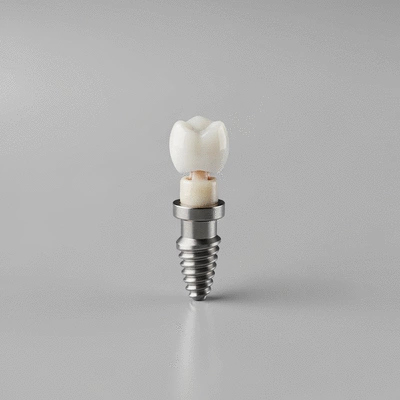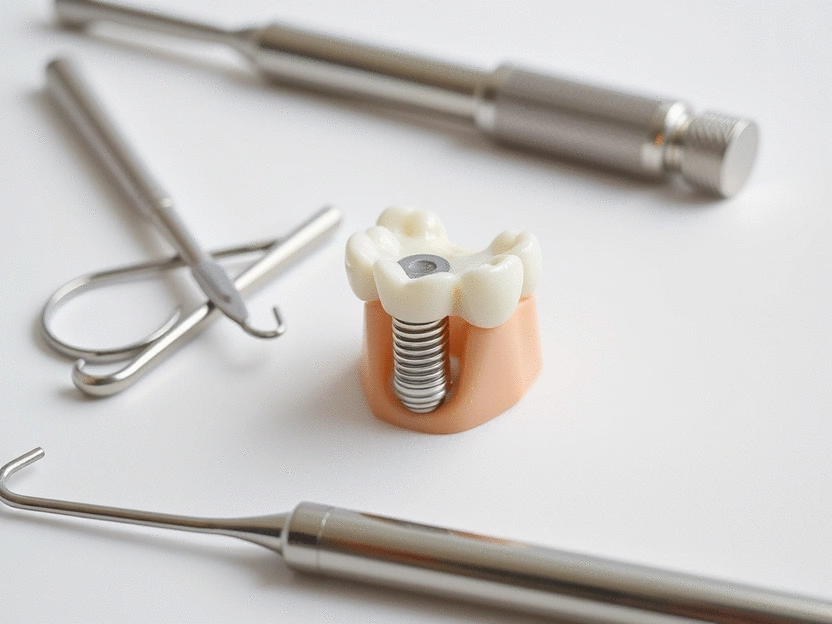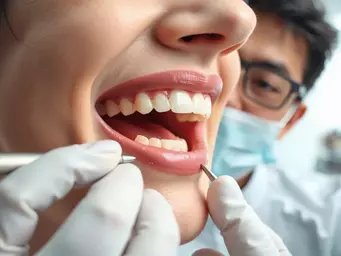**Implant:** Titanium post in jawbone.
Nov 06
Dental Implants: Costs and Benefits
Click the play button above to listen to the article
Are you aware that dental implants can not only replace missing teeth but also help maintain the structure of your jawbone? Understanding their function can empower you to make informed decisions about your oral health!
What You Will Learn
- Dental implants consist of three main components: the implant, abutment, and crown, each playing a crucial role in restoring your smile.
- Titanium is commonly used for implants due to its biocompatibility, ensuring the body accepts it without adverse reactions.
- Osseointegration is the process where the jawbone integrates with the titanium post, providing a stable foundation for the implant.
- Understanding the costs and benefits of different types of dental implants helps you make the right choice for your individual needs.
Key Aspects of Dental Implants
This visual outlines the core components of dental implants and compares different implant types based on their costs and benefits.
Understanding Dental Implants: What They Are and How They Function
Dental implants are a popular solution for replacing missing teeth and can significantly enhance your smile! As someone who is dedicated to educating my patients, I believe understanding the basics is the first step toward making informed decisions about your oral health. So, what exactly are dental implants? In simple terms, they are artificial tooth roots made of biocompatible materials that are surgically placed into the jawbone.
This innovative approach not only provides a foundation for replacement teeth but also mimics the function of natural tooth roots. As a result, dental implants can help maintain the jawbone's structure and prevent further bone loss, which is crucial for overall oral health. For more general information on oral health, you can refer to resources from the Centers for Disease Control and Prevention (CDC).
Defining Dental Implants: The Basics
At its core, a dental implant consists of three main components that work together to restore your smile:
- The Implant: This is the titanium post that is inserted into your jawbone.
- The Abutment: A connector that holds the crown and is placed above the implant.
- The Crown: The visible part that resembles your natural tooth, crafted to match the color and shape of your existing teeth.
By understanding these components, you can appreciate how dental implants function as a cohesive unit to restore both aesthetics and functionality to your smile.
The Components of Dental Implants Explained: Titanium, Abutments, and Crowns
Let’s delve deeper into the materials involved in dental implants. Titanium is the most commonly used material for the implant itself because of its biocompatibility, meaning your body accepts it without any adverse reactions. This is essential for the longevity of your implant.

Next, the abutment, typically made of titanium or zirconia, serves as the bridge between the implant and the crown. It’s crucial for ensuring a secure fit that allows for natural function.
Finally, the crown, which can be made of porcelain or resin, is custom-designed to match your natural teeth. Did you know that these materials are chosen not just for their appearance but also for their durability? This combination ensures your smile looks great and functions well for years to come!
How Dental Implants Work: The Procedure Overview and Osseointegration
Now that you have a foundational understanding of dental implants, let’s talk about how the procedure works. The process begins with a thorough evaluation, where X-rays and possibly 3D imaging are used to assess your jawbone and ensure it can support an implant.
Once we determine you’re a suitable candidate, the implant is surgically placed into the jawbone. This is where osseointegration comes into play—it’s the process where the jawbone integrates with the titanium post, creating a stable foundation. This healing period can take anywhere from a few weeks to several months.
After osseointegration is complete, the abutment is attached, followed by the custom crown. At DentistFortMyers, I take pride in guiding you through each step of this journey, ensuring you understand what to expect along the way!
We Want to Hear From You!
As you consider dental implants, what aspect concerns you the most? Is it the cost, the procedure itself, or the recovery time? Share your thoughts below:
Frequently Asked Questions About Dental Implants
- What are the main components of a dental implant?
- A dental implant consists of three primary parts: the implant (a titanium post surgically placed into the jawbone), the abutment (a connector for the crown), and the crown (the visible, natural-looking tooth).
- Why is titanium used for dental implants?
- Titanium is chosen for dental implants due to its excellent biocompatibility, meaning the body readily accepts it without adverse reactions. This property is crucial for successful osseointegration and long-term implant stability.
- What is osseointegration?
- Osseointegration is a biological process where the jawbone physically fuses with the titanium implant post. This creates a strong, stable foundation for the replacement tooth, similar to how a natural tooth root is anchored.
- What are the different types of dental implants available?
- Common types include single tooth implants (for one missing tooth), implant-supported bridges (for several missing teeth), and full mouth implants (for complete restoration). Each type has varying costs and benefits depending on the patient's needs.
- How do I choose the right type of dental implant for me?
- The best way to determine the right implant type is to consult with a qualified local dentist. They can assess your oral health, discuss your needs and budget, and recommend the most suitable option for your unique situation.
Summarizing the Key Aspects of Dental Implants
As we wrap up our discussion on dental implants, it’s essential to take a moment to weigh the costs against the benefits of various implant types. Dental implants can be a significant investment, but understanding their value is crucial for making an informed decision. Here are key aspects to consider:
- Types of Implants: From single tooth implants to full mouth restorations, the type you choose will influence the overall cost.
- Longevity: Implants often last longer than other options, providing a durable solution that can save money in the long run. For insights into dental expenses, you can explore data from the American Dental Association's Health Policy Institute.
- Aesthetic Appeal: Custom crowns enhance your smile and improve confidence, further justifying the investment.
When considering dental implants, don’t forget to evaluate your personal circumstances and priorities. This approach will help clarify whether the benefits outweigh the costs for your unique situation.
Weighing the Costs Against the Benefits of Different Implant Types
Every dental implant comes with its own set of costs and benefits. For example, while single tooth implants may be less expensive initially, full mouth implants offer comprehensive solutions for those missing multiple teeth. Here’s a quick comparison:
- Single Tooth Implants: Ideal for replacing one lost tooth, they can improve oral health and aesthetics.
- Implant-Supported Bridges: Great for replacing several teeth, these can be more cost-effective than individual implants.
- Full Mouth Implants: While this option has a higher upfront cost, it provides a complete solution and restores full functionality.

Understanding the differences helps you decide which type of dental implant is right for you and your budget. Every patient’s needs are unique, so it’s essential to consider all factors before making a commitment.
Final Considerations Before Making Your Decision: Consulting with Local Dentists
Before proceeding with dental implants, it’s critical to consult with a qualified local dentist. Here’s why this step is so important:
- Personalized Assessment: A dental professional can evaluate your oral health and determine the best approach for your situation.
- Cost Breakdown: They can provide detailed estimates and explain what factors affect your costs.
- Recovery Guidance: Your dentist can offer insights into the recovery process, helping you prepare for any post-operative care needed.
At DentistFortMyers, we understand the importance of these consultations. We encourage you to seek advice from experienced professionals who can guide you through every step of the dental implant journey.
Taking the Next Steps Towards a Healthier Smile with Dental Implants
Finding a Local Dentist: What to Look For in Oral Surgeons and Periodontists
Finding the right dentist can feel daunting, but I’m here to help simplify the process! When searching for an oral surgeon or periodontist, consider these factors:
- Credentials: Look for professionals with specialized training in dental implants.
- Experience: A dentist with a proven track record in implant procedures can offer greater peace of mind.
- Patient Reviews: Checking testimonials from past patients can provide valuable insights into their experiences.
Make sure to reach out to your potential dentists and ask questions about their approach to implant procedures. This will help you find someone you feel comfortable with.
Setting Up a Consultation: Preparing Your Questions About Implant Surgery
Once you've identified a few dentists, the next step is to set up a consultation. Here are some questions you might want to consider asking during your appointment:
- What is the overall cost estimate for my dental implants?
- How long will the entire process take, from preparation to recovery?
- What kind of aftercare will I need once the implants are placed?
Preparing these questions can help you feel more confident and informed during your consultation. Remember, it’s your right to ask about anything that concerns you regarding your dental health.
Encouraging Your Journey: Reaching Out for More Information on Dental Tourism
If you're considering dental implants, you may want to explore dental tourism as an option. This can provide access to affordable dental care without compromising quality. Research on the effectiveness and long-term outcomes of dental implants can be found in academic journals such as PMC NCBI. While you investigate this route, keep in mind:
- Cost Savings: Many patients find significant savings by traveling abroad for treatments.
- Quality Assurance: Research clinics thoroughly to ensure they meet high standards of care.
- Travel Considerations: Be aware of travel costs and other factors when planning your trip.
Embarking on your dental journey is exciting! If you have any questions about dental tourism or need assistance finding a local dentist, feel free to reach out at DentistFortMyers. Together, we can help you achieve a beautiful, healthy smile!
Recap of Key Points
Here is a quick recap of the important points discussed in the article:
- Understanding Dental Implants: Dental implants are artificial tooth roots that provide a stable foundation for replacement teeth and help maintain jawbone structure.
- Components of Implants: Each dental implant consists of three main parts: the implant (titanium post), the abutment (connector), and the crown (visible tooth part).
- Osseointegration Process: The success of dental implants relies on osseointegration, where the jawbone heals and integrates with the titanium post.
- Types of Implants: Choices vary from single tooth implants to full mouth restorations, each with unique benefits and costs.
- Consultation is Key: Always consult with a qualified dentist to evaluate your oral health, understand costs, and prepare for recovery before proceeding with implants.

Dr. Samantha L. Rhodes
Dedicated dental professional. Specialist in preventive & cosmetic dentistry. Passionate about patient education.
Dr. Rhodes is committed to providing comprehensive oral health care, ensuring patients receive top-notch, individualized treatment. Through DentistFortMyers.com, she empowers Fort Myers residents and visitors with the knowledge to make informed decisions about their dental health. Explore our blog for insights on maintaining a healthy, confident smile and enhancing your overall well-being.


